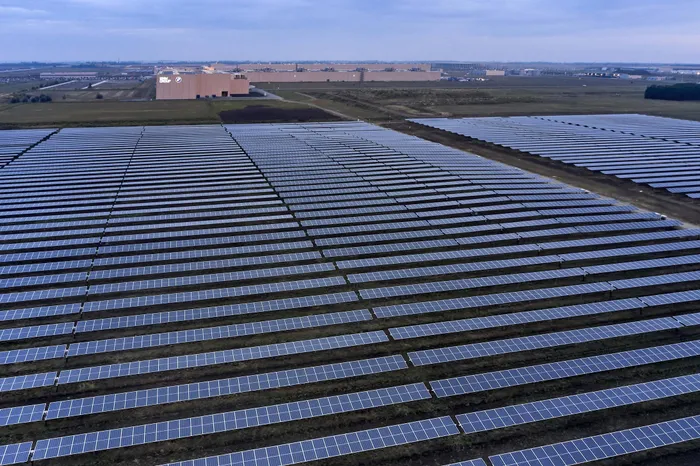What is an electro-state and why South Africa needs to become one

The electrotech revolution gives South Africa a chance to reindustrialise. The country has exceptional solar and wind resources, says the author.
Image: Supplied
The world is entering a new energy era, one defined by technological mastery. In this emerging reality, the countries that lead will not be those with the largest fossil fuel reserves, it will be those that can produce, store, and use electricity efficiently across every sector of their economies. This is the beginning of the age of electrotech and the rise of what can be called the electro-state.
An electro-state is a nation whose economy runs primarily on electricity-based technologies rather than on fossil fuels. The shift toward this model is neither ideological nor optional. It is structural, economic, and inevitable. It represents the point where physics, economics, and geopolitics intersect. This transformation is driven by technologies that make it possible for electricity itself to be classified as primary energy.
Previously, primary energy referred to fossil fuels, which had to be converted into steam, heat, fuel or electricity before use. That system is giving way to one in which electricity is both the starting point and the end product of the energy process.
For more than a century, economic growth has depended on finite commodities such as coal, oil, and gas. Each tonne or barrel consumed advanced productivity but deepened dependency. Energy security became synonymous with control over fuel sources, while price was determined by scarcity and geopolitical influence. The electrotech revolution changes this relationship completely.
According to the recent Ember report, energy is no longer a finite commodity. It has become a manufactured technology. Solar, wind, battery systems, and digital grids can now produce more usable energy each year than all fossil fuels ever extracted. Unlike fossil fuels, these technologies become cheaper as they scale. The cost of solar power has fallen by more than 90 percent in a single decade. Every additional megawatt installed drives future costs lower, creating a cycle of abundance rather than scarcity.
An electro-state is not simply a country in which renewable energy is deployed at large scale, it is a country which transforms its primary energy source to electricity and uses it in all aspects of its economy. The real hallmark of an electro-state is full integration, where generation, distribution, and consumption are all electrified, digitised, and interconnected.
Electro-states are energy sovereign. Power is generated locally, consumed locally, and reinvested locally. China is the first large-scale example. It leads the world in the manufacture of solar panels, batteries, and electric vehicles while electrifying its transport and industrial sectors. Its advantage lies in controlling every layer of the electrification value chain.
For South Africa, the argument for becoming an electro-state is both moral and practical. Our energy system remains trapped in twentieth-century thinking. We export coal, import liquid fuels, and rely on fossil-based electricity that pollutes the air and undermines public health. This model has reached its natural limit. Electricity shortages, high tariffs, and unreliable supply are not isolated issues. They are the symptoms of a system structured around scarcity.
The electrotech revolution gives South Africa a chance to reindustrialise. The country has exceptional solar and wind resources, strong technical skills, and an industrial base capable of transformation. Our path to energy security lies in producing more electricity and using it intelligently across all sectors. Becoming an electro-state is not about decarbonisation, it is about reindustrialisation, efficiency and economic renewal.
Every new megawatt of renewable energy requires engineers, technicians, welders, and logistics planners. Every factory that runs on clean power can operate more efficiently and at lower cost. Every household that can cook, refrigerate, and charge a vehicle with reliable electricity experiences a direct improvement in quality of life. The transition requires coordinated policy rather than disconnected initiatives.
Tariffs must reward efficiency and protect affordability. All role players need to participate actively in increasing electrification of the economy. Industrial policy should advance electrification. Manufacturing incentives must prioritise local production of all aspects of the electrification value chain including electric vehicles. Skills programmes must be aligned with these objectives. In a global shift from fuel to technology, those who act will become successful. South Africa has the natural resources, infrastructure, and human capital to guide Africa’s energy transition. What remains is the political will to make it happen.

Thomas Garner holds a Mechanical Engineering degree from the University of Pretoria and an MBA from the University of Stellenbosch Business School.
Image: Supplied
Thomas Garner holds a Mechanical Engineering degree from the University of Pretoria and an MBA from the University of Stellenbosch Business School. Thomas is self-employed focusing on energy, energy related critical minerals, water and communities. He is a Fellow of the South African Academy of Engineering and a Management Committee member of the South African Independent Power Producers Association.
*** The views expressed here do not necessarily represent those of Independent Media or IOL.
BUSINESS REPORT